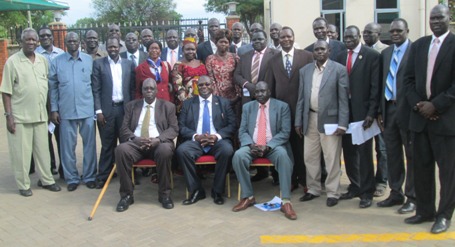We want peaceful party politics, Jikany-Nuer community tells South Sudan presidency
May 4, 2013 (JUBA) – The Jikany-Nuer community of the oil-rich South Sudan’s Upper Nile state said their consistent message to President Salva Kiir and his deputy Riek Machar is to maintain peaceful internal party politics in the interest of the nation.

The community reiterated its recommendations to the two leaders during a Saturday meeting with the Vice president of South Sudan Riek Machar who is also the deputy chairman of the ruling party, the Sudan People’s Liberation Movement (SPLM).
On Wednesday the community leaders in the parliament and executive branch met with Kiir and presented to him their concerns in a resolution they earlier passed that called on the two leaders to exercise restrain after commotions over internal party contest for chairmanship and a subsequent republican order by the president withdrawing “delegated powers” from the VP.
Confusion was also caused when one of the Jikany-Nuer sons and current chairman of the South Sudan Relief and Rehabilitation Commission (SSRRC), Peter Lam Both, on the state-owned SSTV said the “problem” between the two leaders was provoked by VP Machar.
The statement was met with sharp criticisms against Both by his colleagues who together met the president, stressing that Both’s statement did not reflect the position of the community that was presented to the president in the meeting.
During the Saturday meeting with the vice-president community leaders confirmed that the statement by an “individual” was not the official position of the community and its leadership.
David Koak Guok, the chairman of the Jikany-Nuer community in Juba expressed satisfaction over the clarifications presented to them by the VP.
Guok, currently also the chairman of the South Sudan Local Government Board, quoted the VP as saying that there were no delegated powers withdrawn from him.
Machar explained that the “additional functions and duties” given to him in 2007 have either elapsed or that the VP had already discharged them.
Those delegated functions to the vice-president included overseeing the implementation of the 2005 Comprehensive Peace Agreement (CPA) and conduct of the referendum on self-determination.
Both processes ended with the January 2011 vote and declaration of independence in July 2011, the VP told the delegation.
Machar, he added, assured them that there were no personal differences between him and his president, adding that only normal internal party politics on transformation and transition were being discussed.
The community however called upon the two leaders to publicly reassure the nation of their continued comradeship in the government and affirming their desire to play peaceful party politics without involving the army or polarizing the communities.
Jikany-Nuer community of the eastern bank of the River Nile inhabits four counties of
Nasir, Maiwut, Longochuk and Ulang in South Sudan’s Upper Nile state, with an overall population of nearly half a million, according to the 2008 population census.
In Unity state, the Jikany-Nuer of the western bank inhabits one county, Guit, near the capital, Bentiu.
Leaders like the incumbent governor Taban Deng Gai and Angelina Teny, wife of the vice-president, both come from the Jikany-Nuer community of Unity state.
The community also has a sizable population across the border in the Ethiopian region of Gambella which borders Upper Nile and Jonglei states and its members hold senior political positions in the neighboring country, including the current president of Gambella region, Gatluak Tut Khot.
Familiar places to South Sudanese such as the historical place, Bilpam, where the SPLM/A was headquartered during the civil war years, and Itang, where most of the South Sudanese refugees were resettled in Ethiopia are also inhabited by the Ethiopian Jikany-Nuer communities across the borders.
(ST)
